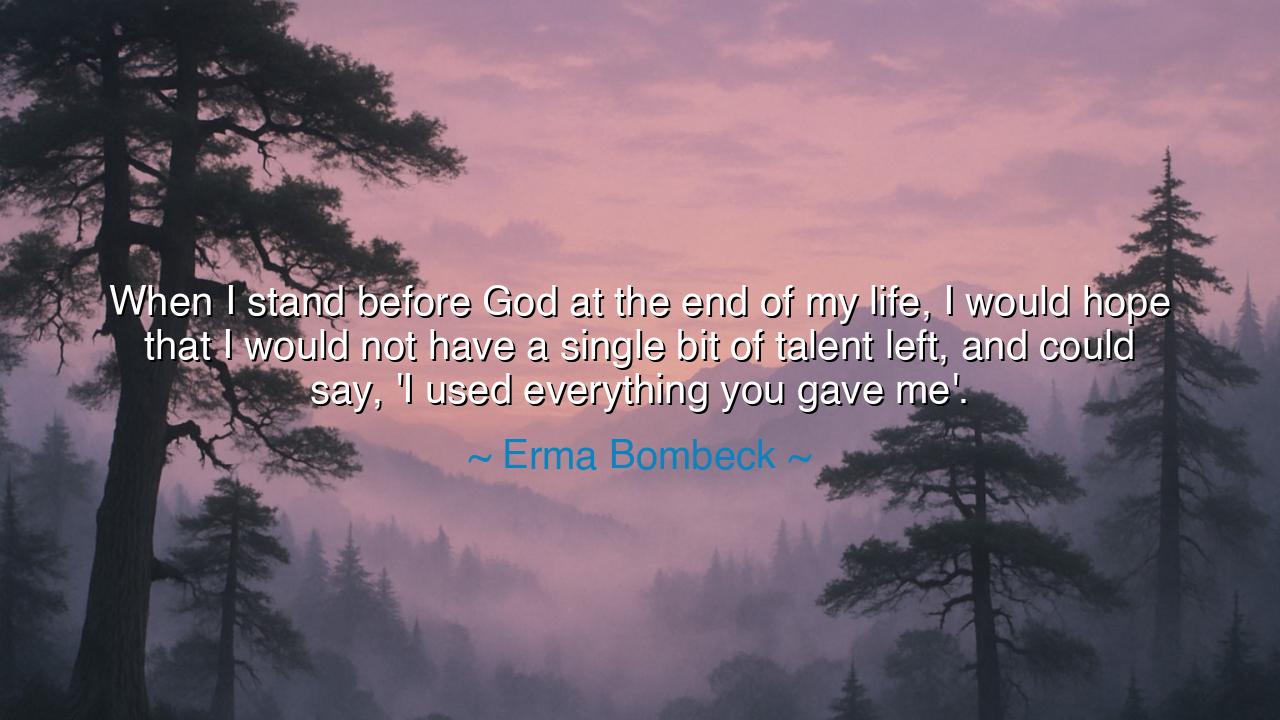
When I stand before God at the end of my life, I would hope that
When I stand before God at the end of my life, I would hope that I would not have a single bit of talent left, and could say, 'I used everything you gave me'.






“When I stand before God at the end of my life, I would hope that I would not have a single bit of talent left, and could say, 'I used everything you gave me.'”
These are the words of Erma Bombeck, a woman whose humor and wit carried profound truths. Her words touch upon a central theme in the journey of life: the fulfillment of one’s purpose and the sacred use of the gifts we are given. Bombeck’s statement is not one of regret, but a declaration of a life well-lived, a life lived fully, where every talent, every ability, every breath is spent in service, creation, and giving. It is a reflection on the deepest purpose of human existence: not to hoard our gifts, but to empty ourselves in the act of living.
In the ancient wisdom of the world, the idea of returning to the source of life with nothing left, having spent all, is one of the highest ideals. The Greeks believed in the concept of arete — the pursuit of excellence and virtue. It was not enough to merely exist; one was called to exhaust their potential, to use all their gifts to the fullest, and to meet their end with no regrets. In this sense, Bombeck’s words echo the cry of the ancients: use all that you have, for life is not about holding back, but about giving all you can. To leave the world with unused potential is to dishonor the gifts you were given.
Think of the great Leonardo da Vinci, whose talents ranged from art to science, engineering to anatomy. His genius knew no bounds, and yet, his life was dedicated to never holding back. Da Vinci, ever restless, was a man who saw each of his creations — whether the Mona Lisa or the sketches of flying machines — not as mere works of art, but as expressions of the divine. He sought to use every ounce of his brilliance in service to discovery and beauty. At the end of his life, Leonardo did not retreat into complacency or rest, for he knew that the divine gift of talent must be poured out, not withheld. In this way, da Vinci lived by Bombeck’s vision: to return to God with nothing left to give, having emptied himself in the pursuit of greatness.
In contrast, there are those who live with their gifts buried, not daring to fully step into their potential. They are like the parable of the talents, where the servant hides his master’s gold, fearing loss, only to have it taken from him in the end. We too often cling to what we possess — our talents, our time, our hearts — as if there is a scarcity of life to be lived. Bombeck, however, offers a profound counterpoint: spend yourself. Let no part of you remain unused. Whether your gift is the gift of creativity, compassion, wisdom, or strength, spend it on the world. In the end, the question will not be, "What did you keep?" but "What did you give?"
Consider the life of Helen Keller, who, despite the challenges of being deaf and blind, used every ounce of her inner strength to impact the world. She did not retreat into isolation, though the world often saw her as broken. Instead, she used her talents, however limited they may have seemed, to educate and inspire others. Her life was a testament to Bombeck’s sentiment: at the end of her life, Keller could say she had given all. Her talents were poured out in service, not just to herself, but to humanity. In this way, she emptied herself, having used all that she was given to uplift others.
What, then, is the lesson for us? It is this: talent is not meant to be preserved for some future use or hidden away. It is meant to be given, to be poured out into the world. Every moment that we hesitate, every time we hold back our gifts, we are not living in the fullness of our purpose. The time to use our talents is now, not at some future moment when we feel ready, but in the present, in every encounter, in every breath. Life is not about accumulating for oneself, but about giving all that we have to the world around us, to those in need, and to the divine purpose that flows through us.
Let us make it a habit — each day, as we rise — to ask, “How can I use what I’ve been given today? How can I pour out my gifts for the good of others?” Let us not wait until the end of our lives to realize the full extent of our potential. The time to act is now. And when we stand before God, we can then say, like Erma Bombeck, that we have used everything we were given — every gift, every opportunity, every challenge — for the greater purpose of life. We will know that we have lived fully, that we have returned the gift, and that we have no talent left to offer because we spent it all in the service of others.
In this way, we will not only honor the divine but also find peace at the end of our days. For a life lived in this manner is one of fulfillment, one in which we can look back with no regrets, knowing that we have given all we were meant to give.






AAdministratorAdministrator
Welcome, honored guests. Please leave a comment, we will respond soon